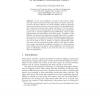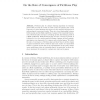234 search results - page 23 / 47 » A polynomial-time nash equilibrium algorithm for repeated ga... |
131
click to vote
CODES
2003
IEEE
15 years 5 months ago
2003
IEEE
In this paper, we describe a new methodology based on game theory for minimizing the average power of a circuit during scheduling in behavioral synthesis. The problem of schedulin...
AI
2006
Springer
15 years 3 months ago
2006
Springer
So far, most equilibrium concepts in game theory require that the rewards and actions of the other agents are known and/or observed by all agents. However, in real life problems, a...
110
click to vote
DIALM
2003
ACM
15 years 5 months ago
2003
ACM
We study topology control problems in ad hoc networks, where network nodes get to choose their power levels in order to ensure desired connectivity properties. Unlike most other w...
106
click to vote
SAGT
2010
Springer
14 years 10 months ago
2010
Springer
Fictitious play is a simple learning algorithm for strategic games that proceeds in rounds. In each round, the players play a best response to a mixed strategy that is given by the...
STOC
2009
ACM
16 years 9 days ago
2009
ACM
The price of anarchy (POA) is a worst-case measure of the inefficiency of selfish behavior, defined as the ratio of the objective function value of a worst Nash equilibrium of a g...




